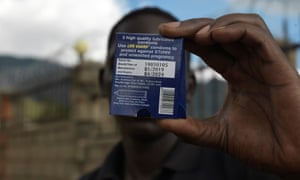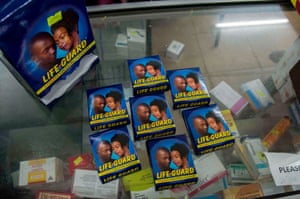mzeiya
Elder Lister
Faulty condoms leave charity facing court case in Uganda
Two men sue over alleged HIV and gonorrhoea infections that they claim were caused by defective contraceptives

Two Ugandan men have taken court action against an international charity for distributing faulty condoms which, they claim, led to one of them contracting HIV and the other gonorrhoea. In a lawsuit, Joseph Kintu and Sulaiman Balinya say they bought Life Guard condoms from stores supplied by the Marie Stopes organisation in Uganda in October last year. In November, Marie Stopes International recalled more than a million condoms from the country after the government drug regulator found that two batches contained holes and did not meet quality standards.
In his sworn affidavit, Kintu states that he bought a packet of condoms from the recalled batches from a pharmacy in the central district of Nakaseke. The condom burst during sex and he said he tested HIV positive on 6 November.
Balinya claims he contracted gonorrhoea after using the condoms.
In a joint petition filed by four law firms to the civil division of the high court in Kampala, the men contend that Marie Stopes Uganda imported and distributed the two faulty batches of condoms to the public before they could be tested and analysed by the National Drug Authority (NDA).
Marie Stopes Uganda, the country’s largest sexual and reproductive health organisation, supplies up to 2 million condoms nationwide each month.
Noel Nuwe, the lead counsel for the plaintiffs, said the men would assert that they were in good health and had no sexually transmitted infections before using the condoms. Both are seeking damages.
“As a result of negligent actions of the defendant, the first plaintiff [Kintu] contracted HIV – a lifetime disease which he inadvertently transmitted to his wife and as a result [he] has suffered mental anguish, inconvenience of which he shall claim general, specific and punitive damages,” reads the court document.
“The second plaintiff [Balinya] contracted gonorrhoea and suffered mental anguish; immense pain and inconvenience for which he shall claim general, specific and punitive damages.”
The petition states that the manufacturer of the defective condoms – MHL Healthcare, based in India – has been suspended from supplying the World Health Organization (WHO) and the UN population fund (UNFPA).

It is estimated that about 6% of Ugandans aged 15 to 49 are living with HIV, with women disproportionately affected by the virus, according to UNAids, the UN agency for tackling the virus. New HIV infections among young women aged 15 to 24 were more than double those among young men.
A spokesman for Marie Stopes International said: “We can confirm that in November 2019 we recalled two batches of Life Guard condoms at the request of Uganda’s National Drug Authority. The batches we recalled contained around 335,000 condom packs in total, of which we recovered 288,000.
“We take every measure possible to ensure that products are of the highest standard. We are currently using a UNFPA-approved manufacturer and products are tested at a WHO-approved test lab before shipment. Life Guard is one of Uganda’s most popular condom brands and we can reassure our clients that this was an isolated issue affecting these two batches only.
“We worked with the National Drug Authority to investigate what happened with these two batches and are implementing safeguards to ensure our products continue to meet the high standard of quality we and our clients expect.”
HIV activists and campaigners have welcomed the suit as promoting, protecting and respecting health right of Ugandan citizens.
“Uganda has been marred by cases of fake goods imported into the country due to weak functions of agencies such as Uganda National Bureau of Standards (UNBS), NDA and other agencies charged with duties to control entry of fake health goods and supplies into the country,” said Dennis Odwe, health and policy specialist at the Foundation for Integrated Rural Development.
“The duty bearers charged with the mandate of doing due diligence on imported health supplies and commodities in the country should be held accountable for not protecting the health of the public from such risks.
“Such institutions, and the manufacturing company for condoms, should be sued as well.”
Milly Katana, a public health specialist and HIV prevention campaigner, said she would follow the case with interest.
“There should be vigilance at all levels, from the users themselves to standards agencies (UNBS and NDA) as well as the dispensing specialists,” Katana said.
However, she questioned whether a diagnosis of HIV positive could be made as quickly as one of the plaintiffs claims, saying that seroconversion – the time period in which antibodies develop and are detectable in the blood – takes longer than his claim suggests.
Two men sue over alleged HIV and gonorrhoea infections that they claim were caused by defective contraceptives

Two Ugandan men have taken court action against an international charity for distributing faulty condoms which, they claim, led to one of them contracting HIV and the other gonorrhoea. In a lawsuit, Joseph Kintu and Sulaiman Balinya say they bought Life Guard condoms from stores supplied by the Marie Stopes organisation in Uganda in October last year. In November, Marie Stopes International recalled more than a million condoms from the country after the government drug regulator found that two batches contained holes and did not meet quality standards.
In his sworn affidavit, Kintu states that he bought a packet of condoms from the recalled batches from a pharmacy in the central district of Nakaseke. The condom burst during sex and he said he tested HIV positive on 6 November.
Balinya claims he contracted gonorrhoea after using the condoms.
In a joint petition filed by four law firms to the civil division of the high court in Kampala, the men contend that Marie Stopes Uganda imported and distributed the two faulty batches of condoms to the public before they could be tested and analysed by the National Drug Authority (NDA).
Marie Stopes Uganda, the country’s largest sexual and reproductive health organisation, supplies up to 2 million condoms nationwide each month.
Noel Nuwe, the lead counsel for the plaintiffs, said the men would assert that they were in good health and had no sexually transmitted infections before using the condoms. Both are seeking damages.
“As a result of negligent actions of the defendant, the first plaintiff [Kintu] contracted HIV – a lifetime disease which he inadvertently transmitted to his wife and as a result [he] has suffered mental anguish, inconvenience of which he shall claim general, specific and punitive damages,” reads the court document.
“The second plaintiff [Balinya] contracted gonorrhoea and suffered mental anguish; immense pain and inconvenience for which he shall claim general, specific and punitive damages.”
The petition states that the manufacturer of the defective condoms – MHL Healthcare, based in India – has been suspended from supplying the World Health Organization (WHO) and the UN population fund (UNFPA).

It is estimated that about 6% of Ugandans aged 15 to 49 are living with HIV, with women disproportionately affected by the virus, according to UNAids, the UN agency for tackling the virus. New HIV infections among young women aged 15 to 24 were more than double those among young men.
A spokesman for Marie Stopes International said: “We can confirm that in November 2019 we recalled two batches of Life Guard condoms at the request of Uganda’s National Drug Authority. The batches we recalled contained around 335,000 condom packs in total, of which we recovered 288,000.
“We take every measure possible to ensure that products are of the highest standard. We are currently using a UNFPA-approved manufacturer and products are tested at a WHO-approved test lab before shipment. Life Guard is one of Uganda’s most popular condom brands and we can reassure our clients that this was an isolated issue affecting these two batches only.
“We worked with the National Drug Authority to investigate what happened with these two batches and are implementing safeguards to ensure our products continue to meet the high standard of quality we and our clients expect.”
HIV activists and campaigners have welcomed the suit as promoting, protecting and respecting health right of Ugandan citizens.
“Uganda has been marred by cases of fake goods imported into the country due to weak functions of agencies such as Uganda National Bureau of Standards (UNBS), NDA and other agencies charged with duties to control entry of fake health goods and supplies into the country,” said Dennis Odwe, health and policy specialist at the Foundation for Integrated Rural Development.
“The duty bearers charged with the mandate of doing due diligence on imported health supplies and commodities in the country should be held accountable for not protecting the health of the public from such risks.
“Such institutions, and the manufacturing company for condoms, should be sued as well.”
Milly Katana, a public health specialist and HIV prevention campaigner, said she would follow the case with interest.
“There should be vigilance at all levels, from the users themselves to standards agencies (UNBS and NDA) as well as the dispensing specialists,” Katana said.
However, she questioned whether a diagnosis of HIV positive could be made as quickly as one of the plaintiffs claims, saying that seroconversion – the time period in which antibodies develop and are detectable in the blood – takes longer than his claim suggests.
